
|
Here is a list of just some of the
dictators who were/are supported by America.
The list also shows many of their
brutalities.....
If you see any blue text, you can click
on it to go to a web-site which proves that what is on this page is true and
that there are no lies.
| NAME OF DICTATOR |
NATION AND
PERIOD OF RULE |
OTHER
DETAILS..... |
| Emperor Bao Dai
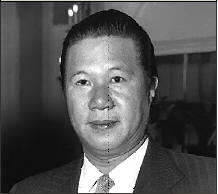 |
Vietnam:
1926-1945
South Vietnam: 1949-1955 |
 |
He was the French puppet
emperor during the French rule of Vietnam
|
 |
While the Vietminh, a
Communist guerrilla group, was fighting against French rule and against
Bao Dai, America actually supported Vietminh |
 |
However, after the Chinese
Revolution of 1949, America was afraid that Vietminh would end up as a
Chinese puppet, so America started supporting the unpopular Bao Dai and
the French |
 |
However, the French were
defeated in 1954 |
 |
The UK, the USSR and the
USA agreed to split up Vietnam into North and South: the North was
Communist and the South ruled by Bao Dai |
 |
After that the USA
undertook the protection of South Vietnam and began to provide help to the
dictator |
 |
Afterwards, Bao Dai, whose
corrupt and inefficient dictatorship had become an embarrassment for
America, was disposed by another dictator, Ngo Dinh Diem |
|
|
Ngo Dinh Diem
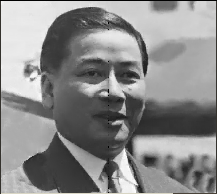 |
South Vietnam:
1955-1963
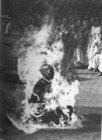
73-year-old Buddhist burning
himself in protest against the leadership of Vietnam |
 |
While his nation was
struggling for independence against French rule, he was living in Europe
and the USA |
 |
He led a military coup
against Bao Dai and declared himself President |
 |
Under the Geneva Conference, there were supposed to be free elections to
be held to unite North and South Vietnam.
|
 |
However, knowing that the Communists would win by 80%, Diem and America
(under Eisenhower) both prevented democratic elections from taking
place. How kind it is of America!!! |
 |
His rule became
increasingly dictatorial as guerrilla resistance from the
Communist-sponsored Vietcong grew in the following years |
 |
Him and his ruling classes
were corrupt Catholic landowners who had little respect for their peasants
they ruled and did not share their Buddhist religion |
 |
The Vietnamese, who were
mainly Buddhists, hated Diem so much that some of them burnt themselves in
protest |
 |
America decided to get rid
of him and supported a military coup against him when he was assassinated |
 |
There were 8 different governments between 1963 and 1975. They were all
very corrupt, dictatorial and supported by the American army during the
Vietnam War. |
 |
Many war crimes were committed by the Americans against the South
Vietnamese people. |
|
|
Chiang Kai-shek |
China: 1928-1949
Taiwan: 1949-1975 |
 |
Had a corrupt, dictatorial
and ruthless regime |
 |
He himself was proud and
stubborn |
 |
Successful in winning
support of foreign powers, especially America and Britain, during the
Civil War but did not gain any support of ordinary Chinese people |
 |
Much of the support he
gained from the West to fight against the Japanese (who had invaded
China), was actually stored to fight against the Communists during the
Civil War |
 |
In fact, he used his best
troops to block supply routes to the Communists rather than to fight the
Japanese |
 |
Dealt ruthlessly with
protests |
 |
Despite all the wartime
hardships he forced the peasants to pay taxes to his army |
|
| Syngman Rhee |
South
Korea:1948-1960 |
 |
His corrupt police state
brutalized and terrorized its opponents to such an extent that western
news correspondents were forbidden to report it |
 |
South Korea was governed
by the tyrannical and unrepresentative regime of Syngman Rhee |
 |
Ruled until 1960 when he
was deposed by Park Chung Hee |
 |
Rhee used troops to force
the legislature to provide for popular election of the president |
 |
Rigged and manipulated the
elections |
 |
His regime was set up with
the help of America and with the protection of the American army |
 |
The USA and the UN came to
defend his regime from Communist invasion of North Korea between
1950-1953. |
|
|
Park Chung Hee |
South
Korea:1960-1979 |
|
| General Chun Doo
Hwan |
South
Korea:1980-1988 |
 |
In December 1979 he ousted
senior military officers, took control of the army, and subsequently
thwarted efforts toward constitutional liberalization |
 |
In May 1980 leading
opposition politicians were arrested and opposition demonstrations were
suppressed with great violence |
 |
After a series of student
demonstrations, Doo Hwan was forced to make democratic reforms and free
elections |
 |
Throughout the rule of pro-American South Korean dictators, there were
many student demonstrations against America which supported the
dictators. |
 |
Many such demonstrations still take place after South Korea had become a
democratic nation |
 |
allowed western
multi-nationals to operate in his country |
|
|
Laurent Kabila
 |
Congo DR: 1997-2001

Persons displaced by ethnic
conflict in Eastern Congo
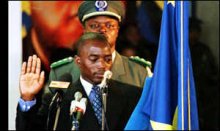
Joseph Kabila- the new
dictator |
 |
took control of the
Democratic Republic of the Congo in 1997 after a bloody war in which his
supporters and Rwandan and Ugandan allies killed tens of thousands of
civilians |
 |
In a second civil war,
Kabila's forces, like those of Rwanda, Uganda, and the Congolese rebels
allied with them, have all engaged in indiscriminate attacks on civilians,
extrajudicial executions, rape, and destruction of property, with the
result of massive displacement of population. |
 |
During his nearly four
years in power, Kabila regularly and ruthlessly violated the human rights
of the Congolese people, killing, torturing, imprisoning, and causing the
"disappearance" of any who he thought threatened him or his regime.
|
 |
Among those who suffered
most were political opponents, leaders of civil society, human rights
activists, and journalists |
 |
Kabila handed out rights to exploit the vast mineral riches of the
country to his commercial and military cronies (including American and
western multi-national companies) |
 |
while the economy as a whole disintegrated and ordinary people lacked
food, medicine, and other basic needs of life, particularly in Kinshasa
and other urban areas. |
 |
He enjoyed the support of
troops from his home region of Katanga, whom he in turn favored with
regular pay and supplies. But other units, ordinarily left unpaid, preyed
on citizens to support themselves. |
 |
International businessmen,
many of them based outside the region, have milked the wealth of the Congo
while their governments exert no effective pressure for peace. |
 |
In 1997 the U.N.
Secretary-General sent a team to investigate war crimes committed by all
parties during the first Congo war. Kabila blocked their work, but the
investigators returned with enough information to conclude that combatants
in the first Congo war had committed crimes against humanity and perhaps
genocide. |
 |
When he died, his son came
to power in a very undemocratic method. But America, as a reward for
allowing American multi-national companies to undermine the Congolese
people, Colin Powell (American Secretary of Foreign Affairs) invited the
new young dictator for dinner as soon as he came to power!! |
|
|
Idi Amin
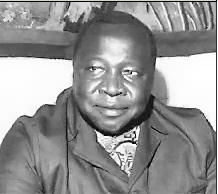 |
Uganda:
1971-1979 |
 |
Followed an erratic, tyrannical, and
increasingly bloody course that left the country in shambles |
 |
Killed 300,000 Ugandans during his rule |
 |
Found refuge in Saudi Arabia, a friendly state
of America |
|
| General Sani
Abacha |
Nigeria: 1993-1999 |
|
|
Francisco Franco
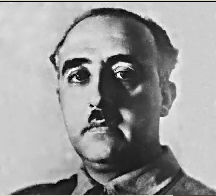 |
Spain: 1939-1975 |
 |
Supported by some western
nations in winning the Spanish Civil War |
 |
He himself was a fascist |
 |
Ordered tens of thousands
of executions during and after the Civil War to guarantee his power |
 |
Although he was excluded
by the United Nations, America signed with him a military assistance pact |
 |
Supported by America
mainly because he was anti-Communist and managed to murder them |
|
|
General Humberto Castelo Branco |
Brazil:
1964-1966 |
 |
Gained extraordinary
powers |
 |
Suppressed the opposition,
especially the Left, who were anti-American |
 |
Restrained civil liberties |
|
|
Marco Vinicio Cerezo Arévalo |
Guatemala:
1985-1991 |
 |
Committed Human Rights
abuses |
 |
Although America had
publicly announced that it would stop supporting the regime, reports later
showed that the CIA had supported it financially and military with $10
million and that the CIA agents had worked to suppress reports of killings
and torture by the army |
|
| Roberto Suazo
Córdova |
Honduras:
1981-1985 |
 |
Although a liberal
democrat, the army had a lot of power during his rule |
 |
The USA held military
exercises along with other pro-American guerrilla groups on Honduras' land
to fight against Nicargua |
|
| Anastasio Somoza
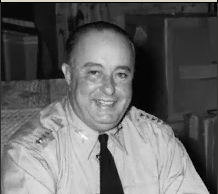 |
Nicaragua:1936-1956 |
 |
A military-minded autocrat, he crushed all opposition with
the aid of the National Guard |
 |
Ruled NIcaragua for 20
years with the support of the USA |
 |
Amassed a personal fortune
during his corrupt, dictatorial rule |
 |
He was succeeded by his son and then by other members of
his family: Luis Somoza Debayle, Anastasio Somoza Debayle and others |
 |
Him and his family ruled the nation for more than 40 years |
 |
His family were more or less a corrupt royal family in a
so-called Republic |
 |
For sometime, his family abolished the constitution and
declared Marshall Law |
 |
Rigged the elections |
 |
Him and his family headed the so-called Liberal Party |
|
|
General Suharto
 |
Indonesia:1967-1999 |
 |
The president who preceded
him, President Sukarno, was a popular leader who introduced many
democratic reforms and led the nation during its struggle for independence |
 |
But America hated the
former leader because of his socialist and nationalist leanings |
 |
Therefore with the help of
the USA, Suharto came to power after overthrowing Sukarno and putting him
under arm arrest |
 |
During this military coup,
General Suharto massacred over 1 million suspected opponents |
 |
Over 300,000 were
arrested, many were only released after his 30 year-rule |
 |
Only 800 out of those
executed and imprisoned were on trail
|
 |
There had been periodic
execution, the last occurred in 1990 |
 |
Suharto turned towards the
west and allowed western multi-national companies to operate in Indonesia |
 |
"Clinton joined his predecessors and
colleagues abroad in ensuring the welfare of the Indonesian tyrants and
murderers and the foreign corporations that benefit from their rule,
blocking and evading congressional restrictions on military assistance."
(SOURCE: Noam Chomsky in Democracy Enhancement, Part II) |
 |
In 1975, Suharto invaded
East Timor, claiming to restore order to prevent Communists to come to
power over there |
 |
Human Rights organizations
say that during the invasion of East Timor, Suharto killed more than
100,000 men, women and children |
 |
A report in the USA which
was only recently released, proved that the American President Ford, and
his Foreign Adviser, Kissinger, had given Suharto the green light to
invade East Timor |
 |
Ironically, it was the
Western nations who later contributed to Suharto's resignation in 1999 and
the independence of East Timor. |
 |
gained western support in
return for allowing multi-nationals to set up |
 |
"In November 1993... Indonesia
submitted to the UN a resolution requesting an opinion from the World
Court on the legality of the use of nuclear weapons. In the face of this
atrocity, the guardians of international morality leaped into action.
The U.S., U.K., and France threatened Indonesia with trade sanctions and
termination of aid unless it withdrew the resolution, as it did.
Traditional clients understand very well when a message from the
powerful is to be heeded."(SOURCE: Democracy Enhancement, by Noam
Chomsky) |
|
| Colonel Hugo
Banzer Suarez |
Bolivia:
1971-1978 |
 |
Moved from a relatively
moderate position to full military control |
|
| Reza Muhammed
Shah Pahlawi
{or just Shah of Iran}
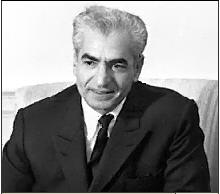 |
Iran:1941-1979 |
 |
Was overthrown temporarily
but was restored to his throne with the aid of the USA in 1953
|
 |
The Americans considered
this a triumph but the Iranian people had always resented his rule |
 |
He began to exercise
increasing control over the government, keeping it closely aligned with
the United States. |
 |
When he used to arrive to
Tehran (the Iranian capital) Airport, he used to see the old houses and
villages of poor people on his way in the plane. He was so arrogant that
he ordered the elimination of the houses!!! |
 |
In March 1959 Iran signed
a defense agreement with the United States |
 |
He used helicopters
against his own people while they were demonstrating |
 |
Led a dictatorial
government which annulled the elections of the lower House Parliament |
 |
On March 2 1975, the shah announced the end of the
multiparty system and the formation of a single-party system |
 |
The shah's responses to
his opposition were increasingly repressive, and he relied heavily on his
secret police, the Savak, which was much dreaded for its harsh methods |
 |
In the late 1970s there
were antigovernment demonstrations, both in Iran and abroad, over alleged
human rights violations, most of which could be traced to the Savak |
 |
There had been, and there
are still, anti-American demonstrations due to America's support to the
unpopular Shah |
|
|
Augusto Ugarte
Pinnochet |
Chile: 1973-1990 |
|
| Fulgencio
Batista |
Cuba:1940-44 and
1952-1959 |
 |
Led a brutal and corrupt
regime |
 |
Rigged the elections |
 |
Suspended the constitution
for some time |
 |
His capitalist regime made
the rich richer and the poor poorer |
 |
Many important sectors of
the Cuban economy were owned by American businesses |
 |
Used US dollars in lavish
bribes for his supporters |
 |
Turned a deaf ear to all
voices of reform |
 |
Later, in the Bay of Pigs,
some of his supporters along with other anti-Communists tried to invade
Cuba after being trained and supported by the CIA |
|
| P.W.
Botha |
South Africa:
1978-1989 |
 |
Only gave democracy to the
white minority |
 |
Treated the native South
Africans, who formed the majority, brutally |
 |
Refused to give
independence to Namibia |
|
| Saddam Hussein
 |
Iraq: 1979-? |
 |
Was supported by financial
and military from America, the west and the Gulf nations to fight against
Iran during the Iran-Iraq War |
 |
Killed and tortured many
of his political opponents |
 |
Believed to have used
chemical weapons against Iran and against his own people while he was
getting support from America |
 |
Ironically, when he began
to fight against western interests in Kuwait, only then he began to be
viewed as a tyrant |
 |
During an Uprising in
1993, the America supported the opponents of Saddam, but then deliberately
left them to be killed by Saddam. 250,000 people were killed. The absence
of Saddam would have meant that there would be no excuse for America to
remain in the Gulf |
|
| Muammar
al-Qaddafi
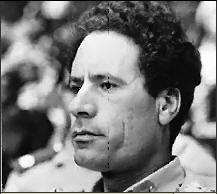 |
Libya: 1969-? |
 |
Soon after his military
coup, Qaddafi had strong anti-Communist views and as a result America
supported him for a short time |
 |
The CIA helped him to
assassinate an opposition group known as the "Muslim Brotherhood" |
 |
However, Qaddafi
eventually pro-Soviet and anti-western and America actually stood against
him |
 |
He was injured and one of
his daughters were killed in 1986 during American attack when he was
accused by America of causing a terrorist attack in West Germany. It was
later proved that he wasn't behind but there was no apology from America |
|
| Rafael Leonidas
Molina Trujillo |
Dominican
Republic: 1930-1960 |
 |
he was trained by members
of the U.S. Marine Corps (the Dominican Republic was then under U.S.
military occupation) |
 |
In 1930 he was elected president without opposition. |
 |
The Trujillo regime brought economic stability to the
country but allowed the people no political freedom whatsoever. |
 |
Trujillo encouraged diplomatic and economic
ties with the U.S. |
 |
Trujillo presided over one of the tightest
dictatorships in the world. |
 |
With the military as the basis of his power,
he and his family directed practically every aspect of the nation's life,
from the courts down to the pettiest bureaucrat |
 |
The national economy, while greatly expanded
and modernized, was run as the dictator's personal corporation, and the
political process was completely dominated by his Dominican Party. Backed
at first by the United States, Trujillo used this support to his own
advantage in shoring up his power. |
 |
The killer and torturer Trujillo took
over the Dominican Republic, remaining a great friend until he began to
get out of hand in the 1950s. |
 |
Discontent and criticism, widespread especially after
World War II ended in 1945, were met with terror and self-serving
propaganda |
 |
At the end, the USA stood against him and he was
assassinated |
|
| Porfirio Diaz
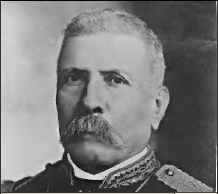 |
Mexico:
1876-1880 and 1884-1911 |
 |
In 1876 he overthrew the
government of President Sebastian Lerdo de Tejada and was installed as
president the following year. |
 |
Because, under the Mexican
constitution, he could not serve two consecutive terms, Diaz retired the
presidency in 1880 |
 |
He was reelected in 1884, secured passage of an amendment
to the constitution permitting a succession of presidential terms, and
remained in power until 1911. |
 |
His regime was marked by
notable achievements, but also by a brutal tyranny. |
 |
Foreign capital,
especially American, was invested in the exploitation of the country's
mineral resources |
 |
foreign investors drained
a great part of the country's wealth, much of the ancient communal lands (ejidos)
of the Native Americans was concentrated in the hands of a relatively
small number of landowners, and poverty and illiteracy were widespread. |
 |
Manifestations of the resulting social discontent were
suppressed by Diaz with an iron hand until the revolution of 1911 |
|
| Morena Manuel
Antonio
Noriega
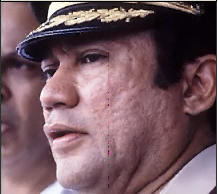 |
Panama:
1983-1989 |
 |
when he was head of
the military intelligence, Noriega became the most feared man in the
country. |
 |
Noriega had been an agent of the
Central Intelligence Agency (CIA) for years, including the time when Bush
had been CIA director |
 |
when it was discovered that he was a
double-agent for both the CIA and the Cuban intelligence, America demanded
his arrest |
 |
America invaded Panama in 1989,
arrested him and he went on trail |
 |
He was convicted with drug
trafficking and money laundering |
|
| Anwar Al Saddat
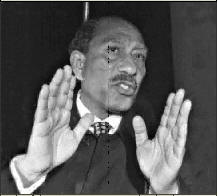 |
Egypt: 1970-1981 |
 |
In 1981, Anwar Al Saddat
organized a plebiscite in Egypt which asked the Egyptian people whether or
not they would allow him to "abduct all of the Egyptian people". |
 |
Of course, very few people
took this ridiculous plebiscite seriously since everyone knew that it
would be manipulated or rigged |
 |
Only 30,000 Egyptians out
of 40 million took part in the elections |
 |
The rigged result was that
99.75% of the Egyptian people allowed the President to abduct all of the
Egyptian people!!!! |
 |
As a result, the President
arrested hundreds of politicians, following different ideologies, without
trial |
 |
And while the arrests were
taking place, a famous propaganda song was shown on TV called, "Sadat- We
all Love You"!!!!! |
 |
He changed the Egyptian
constitution to allow himself to rule Egypt for the rest of his life |
 |
Despite all that, he was
known in the western media, and especially the American, as open-minded,
peace-loving, democratic...... |
 |
He allowed his nation to
host an American army which existed from the 1979 until today. |
 |
Opened the doors to
western foreign investment, imports and privatization which had resulted
in nothing but the deterioration of the Egyptian economy |
|
|
Husni Mubarak
 |
Egypt: 1981-? |
 |
Egypt has long
been a key country for U.S. strategy in the Middle East and will soon host
some 23,000 U.S. troops for long-scheduled military exercises, Operation
Bright Star. The Cairo West airbase could be an important forward-supply
base for attacks on Afghanistan. |
 |
Following a
resurgence of political violence in the early 1990s, the government
introduced anti-terror laws giving the security and intelligence services
greater powers of arrest and detention and rounded up thousands of
suspects. |
 |
There are now
20,000 political prisoners who were not put on trial |
 |
Among them are
individuals who were arrested as children in their early teens and who
remain incarcerated as adults. Others were kept in prison though their
sentences had expired. |
 |
The state also
uses emergency rule to refer civilian defendants to military courts or to
exceptional state security courts, in effect creating a parallel court
system under direct government control. |
 |
Since 1992
hundreds of civilians have been referred to military courts. These trials,
sometimes held en masse, fail to meet international fair trial standards:
basic rights, such as the right to appeal, have been routinely violated,
even in cases where the defendants faced and were punished with the death
penalty. |
 |
These measures
have been used widely against Egyptians attempting to exercise peacefully
basic political rights like freedom of association or freedom of
expression, as well as persons accused of committing or advocating acts of
violence. |
 |
Non-governmental
organizations, professional associations, the media, trade unions and
political parties - all have had their work hampered by laws aimed at
silencing them and increasing governmental control over their activities. |
 |
Torture in Egypt
is widespread and systematic. Security forces and the police routinely
torture or ill-treat detainees, particularly during interrogation. In his
January 2001 report to the Commission on Human Rights, the United Nations
Special Rapporteur on Torture cited thirty-two cases of death in custody,
apparently as a result of torture, occurring between 1997 and 1999. |
 |
The 1992
Anti-Terror Law also criminalized non-violent political opposition, and
was used to arrest and bring to trial persons not accused of committing or
advocating violence but simply of alleged affiliation with the Muslim
Brotherhood. |
|
| King Hussein |
Jordan:
1952-1999 |
 |
In 1970, he fought against the
Palestinian Liberation Organization for several reasons, including
gaining the acceptance of the USA |
 |
In 1973, he suspected that Egypt and
Syria were going to fight against Israel, so he flew with his plane,
secretly on his own, to warn Golda Meir, the Israeli premier at that
time. However, the Israelis ignored his warnings. |
 |
By signing the treaty with Yitzhak Rabin
in 1994, Hussein made his country basically out of the Arab-Israeli
conflict and arrested many Jordanians who tried to help the Palestinians
without trial. |
 |
The Parliament in his country is
relatively weak and does not participate in the decisions involving
relations with the USA or Israel. |
 |
"A marked deterioration in respect for
basic freedoms has seriously affected the ability of Jordanians to make
informed choices on election day. It's worrying when individuals are
afraid to engage in peaceful political activities or to even express
their views -- because they may be arrested, face criminal prosecution,
or lose their jobs," Hanny
Megally, executive director of the Middle East division of Human Rights
Watch commenting on the 1997 Parliamentary elections. |
 |
political activists, students, writers,
and researchers have faced a variety of sanctions -- ranging from
detention, criminal prosecution, and imprisonment to harassment, job
loss, and blacklisting -- because they expressed views on political
subjects that the government preferred remain off-limits.
|
 |
"Such measures have created an atmosphere
in which the right to free expression is under siege," Human Rights
Watch says. |
 |
In the 1950s, a large group of
politicians following a range of ideologies were tortured.
|
 |
According to the current General
Secretary of the Jordanian Communist Party, who had been one of those
prisoners, a former Nazi was the trainer of torturers and the methods
ranged from electric chairs to injecting chemicals which caused severe
pains in their bodies.
|
 |
Most polls show that the treaties signed
by King Hussein with the USA and Israel were done against the will of
the Jordanian people. |
|
| King Abdulla |
Jordan:
1999-? |
 |
During the Intifada and amid increasing
anti-Arab actions from Israel and the USA, King Abdulla had actually
increased economic trade with both nations. |
 |
Just after the Intifada had started on
the 28/9/2000, King Abdulla signed a treaty with Bill Clinton, the
former President of the USA, for free trade between the USA and Jordan,
weakening the Jordanian local industry. |
 |
In the year 2001, the Jordanian
government began to implement restrictions on political opinion on the
Internet- something which rarely occurs in the world. |
 |
Demonstrations demanding the end of
Israeli-Jordanian relations during the Israeli invasions of Palestinian
areas in April 2002 were crushed. |
 |
Peaceful anti-American demonstrations,
leaflets and other political actions were prevented or even crushed by
the Jordanian government. |
|
|
Francois Duvalier (known as Papa Doc) |
Haiti: 1957-1971 |
|
|
Jean-Claude Duvalier (known as Baby Duc) |
Haiti: 1971-1986 |
 |
The 19-year-old Duvalier became president after the
death of his father on April 21, 1971; the position was reaffirmed for
life by a constitutional revision in 1985. |
 |
When he took over in 1971, relations rapidly improved,
and Haiti became another "darling" of the business community, along with
Brazil under the neo-Nazi generals and other right-thinking folk. |
 |
USAID undertook to turn Haiti into the "Taiwan of the
Caribbean," forecasting "a historic change toward deeper market
interdependence with the United States," Trouillot observes. |
 |
U.S. taxpayers funded projects to establish assembly
plants that would exploit such advantages as enormous unemployment
(thanks in part to USAID policies emphasizing agroexport) and a
workforce -- mainly women, as elsewhere considered more docile -- with
wages of 14 cents an hour, no unions, ample terror, and the other usual
amenities. |
 |
The consequences were profits for U.S. corporations and
their Haitian associates, and a decline of 56% in wages in the 1980s. In
short, if not Taiwan exactly, Haiti was an "economic miracle" of the
usual sort. |
 |
Advisers loyal to his father's regime still
held important positions, and his mother exercised considerable
influence. |
 |
An exodus of refugees to the Bahamas and to
the United States during the late 1970s and early 1980s, a result of
political oppression and deepening poverty, drew international attention
to the Duvalier regime |
 |
The 1985 steps to enhance democracy in Haiti
were "an encouraging step forward," the U.S. Ambassador informed his
guests at a July 4 celebration. The Reagan Administration certified to
Congress that "democratic development" was progressing, so that military
and economic aid could continue to flow -- mainly into the pockets of
Baby Doc and his entourage. |
 |
It also informed Congress that the human
rights situation was improving, as it was at the time in El Salvador and
Guatemala, and today in Colombia, and quite generally when some client
regime requires military aid for "internal security." |
 |
The House Foreign Affairs Committee,
controlled by Democrats, had given its approval in advance, calling on
Reagan "to maintain friendly relations with Duvalier's non-Communist
government." |
 |
Haiti's legislature unanimously adopted a
new law requiring that every political party must recognize
President-for-Life Jean-Claude Duvalier as the supreme arbiter of the
nation, outlawing the Christian Democrats, and granting the government
the right to suspend the rights of any party without reasons. The law
was ratified by a majority of 99.98%. Washington was deeply impressed.
(SOURCE: Democracy Enhancement, Part II, by Noam Chomsky)
|
 |
As a result of rising opposition Duvalier fled Haiti in
early 1986 and settled temporarily in France; a junta succeeded him. |
 |
This was described by the Wall Street
Journal with engaging frankness: after "huge demonstrations," the
White House concluded "that the regime was unraveling" and that "Haiti's
ruling inner circle had lost faith in" its favored democrat, Baby Doc.
|
 |
"As a result, U.S. officials, including
Secretary of State George Shultz, began openly calling for a `democratic
process' in Haiti." Small wonder that Shultz is so praised for his
commitment to democracy and other noble traits.
|
 |
The meaning of this call for democracy was
underscored by the scenario then unfolding in the Philippines, where the
army and elite made it clear they would no longer support another
gangster for whom Reagan and Bush had expressed their admiration, even
"love," not long before, so that the White House "began openly calling
for a `democratic process'" there as well. Both events accordingly enter
the canon as a demonstration of how we "served as inspiration for the
triumph of democracy in our time" in those wondrous years (New
Republic). |
|
SOURCES:
Human Rights Watch
Microsoft Encarta
Longman History
Modern World History by Ben
Walsh
Al Jazeera
Other related articles:
Democracy Enhancement
by Noam Chomsky
Democracy Restored by Noam Chomsky
Passion for Free Markets
by Noam Chomsky
Is
Peace at Hand? by Noam Chomsky
Market Democracy in a Neoliberal Order
by Noam Chomsky
Rogue
States by Noam Chomsky
The
Victors by Noam Chomsky
Vain Hopes,
False Dreams by Noam Chomsky
|


